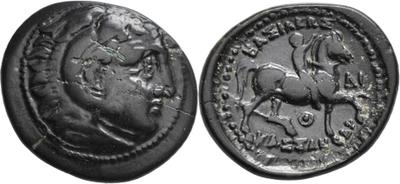3621 - Scotussa (AE Athena/horse) over Cassander (Heracles/rider) (Triton, XV, Jan. 2012, 753.1)
From SILVER
| Line 1: | Line 1: | ||
{{Overstrike | {{Overstrike | ||
| − | |||
|Image reference overstriking coin=https://www.acsearch.info/search.html?id=1174694 | |Image reference overstriking coin=https://www.acsearch.info/search.html?id=1174694 | ||
|Image overstruck variety=Cassander_Herakles_horseman.jpg | |Image overstruck variety=Cassander_Herakles_horseman.jpg | ||
| Line 27: | Line 26: | ||
|Overstruck ancient region=Macedon | |Overstruck ancient region=Macedon | ||
|Overstruck authority=Cassander (regent and king of Macedonia, 317-297 BC) | |Overstruck authority=Cassander (regent and king of Macedonia, 317-297 BC) | ||
| − | |Overstruck date from= | + | |Overstruck date from=305 BCE |
|Overstruck date to=297 BCE | |Overstruck date to=297 BCE | ||
|Overstruck period=Hellenistic | |Overstruck period=Hellenistic | ||
Revision as of 12:37, 22 April 2024
300 BCE - 200 BCE | ΣΚΟΤΟΥΣΙΩΝ
Images
Overstruck variety

Cassander_Herakles_horseman.jpg [1]
Location/history
| Sale(s)Sale(s) ᵖ: | Classical Numismatic Groupe, Triton 15, 03 Jan. 2012, n°753.1. | |
Overstriking coin
Description
| ObverseInscription or printing placed on the obverse.: | Head of Ares or Athena right, in crested helmet. Border of dots. | ReverseInscription or printing placed on the reverse.: | ΣΚΟΤΟΥΣΙΩΝ (Greek) Bridled horse prancing right. |
Mint and issuing power
| MintIdentifies the place of manufacture or issue of a numismatic object.: | Scotussa | Ancient regionAncient region. | Thessaly | Modern countryModern country: Greece | AuthorityIdentifies the issuing power. The authority can be "pretended" when the name or the portrait of X is on the coin but he/she was not the issuing power. It can also be "uncertain" when there is no mention of X on the coin but he/she was the issuing power according to the historical sources: |
Chronology
| FromIdentifies the initial date in a range assigned in a numismatic context. 300 BCE toIdentifies the final date in a range assigned in a numismatic context.. 200 BCE | Hellenistic 323-30 BC |
Physical description
| MetalThe physical material (usually metal) from which an object is made.: Bronze |
WeightWeight of the numismatic object (in grams). in grams: 5.765.76 g <br />5,760 mg <br /> | DenominationTerm indicating the value of a numismatic object. Examples: tetradrachm, chalkous, denarius.: dichalkon |
AxisDescribes the directional relationship between the obverse and reverse of a numismatic object.: 1212 mm <br />1.2 cm <br /> |
| DiameterDescribes diameter of an object (in mm).: 20.520.5 mm <br />2.05 cm <br /> | |||
References
| Coin referenceReference of the Coin: | https://www.acsearch.info/search.html?id=1174694 | Coin series referenceReference to coin series study: | HGC 41HGC 4, n°615 |
Overstruck type
Description
| ObverseInscription or printing placed on the obverse.: | Head of Herakles right, wearing lion skin. | ReverseInscription or printing placed on the reverse.: | ΒΑΣΙΛΕΩΣ ΚΑΣΣΑΝΔΡΟΥ (Greek) Horseman right. |
Mint and issuing power
| MintIdentifies the place of manufacture or issue of a numismatic object. ᵖ: | Ancient regionAncient region. ᵖ | Macedon | Modern countryModern country: | AuthorityIdentifies the authority in whose name (explicitly or implicitly) a numismatic object was issued. ᵖ: | Cassander (regent and king of Macedonia, 317-297 BC) |
Chronology
| FromIdentifies the initial date in a range assigned in a numismatic context. 305 BCE toIdentifies the final date in a range assigned in a numismatic context.. 297 BCE | Hellenistic 323-30 BC |
Physical description
References
| Coin type referenceReference to coin series study ᵖ: | SNG Copenhagen 32SNG Copenhagen 3, n°1142 |
Additional data
| Frequency of overstrikesFrequency of overstrikes: | Level of confidenceLevel of confidence of the identification: | ||
| RemarksRemarks: | "An overstrike that argues for these coins to be dated in the 3rd, rather than the 4th century BC" | ||
References
- ^ Hoover, Oliver D. (2014), Handbook of Greek Coinage Series 4. Northern and Central Greece : Achaia Phthiotis, Ainis, Magnesia, Malis, Oita, Perrhaibia, Thessaly, Akarnania, Aitolia, Lokris, Phokis, Boiotia, Euboia, Attica, Megaris and Corinthia, sixth to first centuries BC, Lancaster, lxxi, 563 p.
- ^ SNG Copenhagen 3. Thessaly-Illyricum. Epirus-Acarnania. Aetolia-Euboea. Attica-Aegina. Corinth. Philiasia-Laconia. Argolis-Aegean Islands, Copenhagen, 1982.